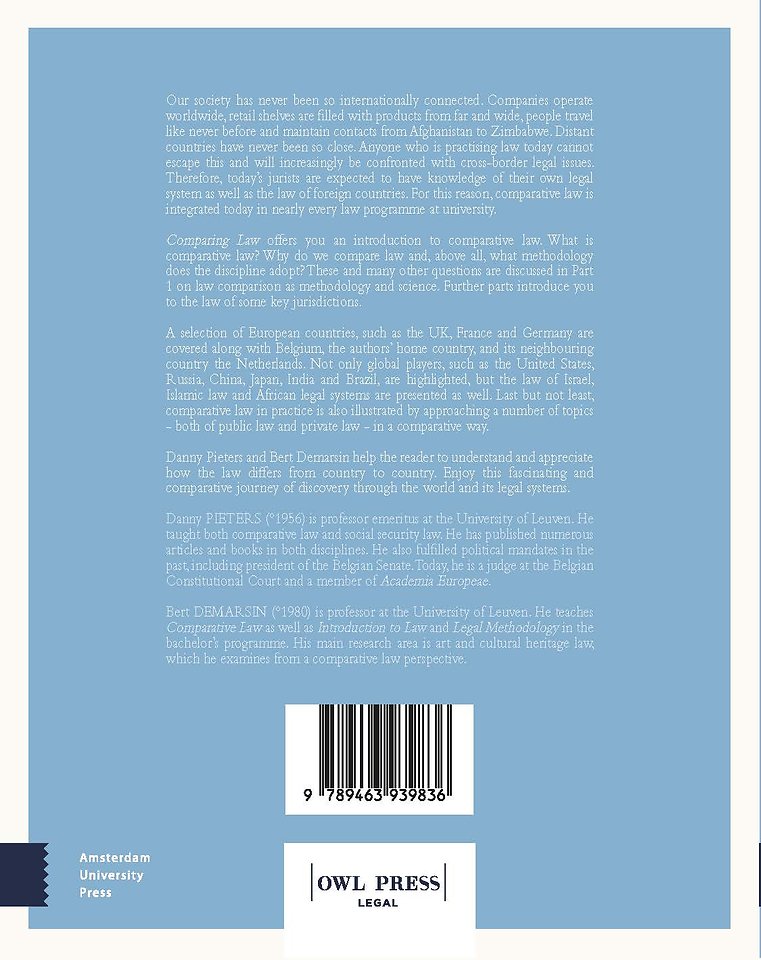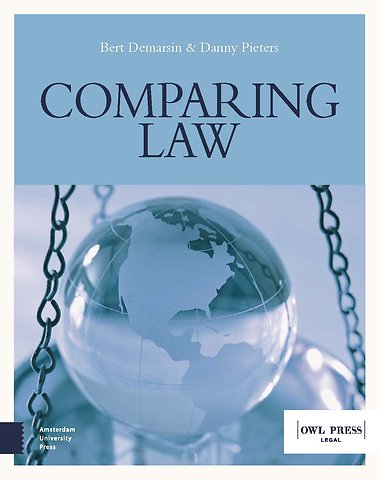



Bert Demarsin (°1980) is hoofddocentaan de KU Leuven. Hij doceert er in de bacheloropleiding niet alleen Rechtsvergelijking, maar ook de vakken Inleiding tot de rechtswetenschap en rechtsmethodiek.
Meer over de auteursComparing Law
Paperback Engels 2023 1e druk 9789048559879Samenvatting
Our society has never been so internationally connected. Companies operate worldwide, retail shelves are filled with products from far and wide, people travel like never before and maintain contacts from Afghanistan to Zimbabwe. Distant countries have never been so close. Anyone who is practising law today cannot escape this and will increasingly be confronted with cross-border legal issues. Therefore, today’s jurists are expected to have knowledge of their own legal system as well as the law of foreign countries. For this reason, comparative law is integrated today in nearly every law programme at university.
Comparing Law offers you an introduction to comparative law. What is comparative law? Why do we compare law and, above all, what methodology does the discipline adopt? These and many other questions are discussed in Part 1 on law comparison as methodology and science. Further parts introduce you to the law of some key jurisdictions.
A selection of European countries, such as the UK, France and Germany are covered along with Belgium and the Netherlands. Not only global players, such as the United States, Russia, China, Japan, India and Brazil, are highlighted, but the law of Israel, Islamic law and African legal systems are presented as well. Last but not least, comparative law in practice is also illustrated by approaching a number of topics – both of public law and private law – in a comparative way.
Danny Pieters and Bert Demarsin help the reader to understand and appreciate how the law differs from country to country. Enjoy this fascinating and comparative journey of discovery through the world and its legal systems.
Trefwoorden
rechtsvergelijking rechtssystemen internationaal recht wetgeving rechtsfamilies juridische methodologie common law Europees recht civil law legal transplants rechtsgeschiedenis rechtspleging constitutioneel recht staatsrecht islamitisch recht federalisme rechtsbronnen familierecht verbintenissenrecht
Trefwoorden
Specificaties
Lezersrecensies
Over Danny Pieters
Inhoudsopgave
U kunt van deze inhoudsopgave een PDF downloaden
PART I – LAW COMPARISON 13
CHAPTER 1. What is law comparison?15
1. The concept of law comparison15
2. Scientific discipline or method? 16
3. Types of law comparison 17
4. Relations with contiguous domains of law and science 19
CHAPTER 2. Why law comparison? 25
1. Multiple functions of law comparison 25
2. Immediate goals and functions of law comparison 27
3. Intermediate goals and functions of law comparison 29
4. Remote goals and functions of law comparison 34
CHAPTER 3. How to compare law 39
1. Methods of law comparison 39
2. Phases of law comparison 40
3. Other points of attention 52
4. Modesty and courage 58
CHAPTER 4. How to group countries 59
1. Legal families 59
2. Legal transplants 67
3. Unitary and federal states 69
4. Monism and dualism 69
CHAPTER 5. United Kingdom 129
1. Historical background 129
2. Organization of the state and sources of law 132
3. Hierarchy of the sources of law 138
4. Characteristics of the legal system 140
5. Organization of the court system 141
6. Influences 145
CHAPTER 6. United States of America 147
1. Historical background 147
2. Organization of the state and sources of law 149
3. Hierarchy of the sources of law 153
4. Characteristics of the legal system 156
5. Organization of the court system 157
6. Influences 159
CHAPTER 7. Russia161
1. Historical background 161
2. Organization of the state and sources of law162
3. Hierarchy of the sources of law 166
4. Organization of the court system 168
5. Influences 169
CHAPTER 8. China 173
1. Historical background 173
2. Organization of the state and sources of law175
3. Hierarchy of the sources of law 179
4. Characteristics of the legal system 180
5. Organization of the court system 182
6. Influences 182
CHAPTER 9. Japan 185
1. Historical background 185
2. Organization of the state and sources of law 187
3. Hierarchy of the sources of law 90
4. Characteristics of the legal system 191
5. Organization of the court system 192
6. Influences 193
COMPARING LAW-8
CHAPTER 10. Brazil 195
1. Historical background 195
2. Organization of the state and sources of law 196
3. Hierarchy of the sources of law 201
4. Characteristics of the legal system 202
5. Organization of the court system 203
6. Influences 205
CHAPTER 11. India 207
1. Historical background 207
2. Organization of the state and sources of law 210
3. Hierarchy of the sources of law 212
4. Organization of the court system 215
5. Influences 215
CHAPTER 12. Israel 219
1. Historical background 219
2. Organization of the state and sources of law 221
3. Hierarchy of the sources of law 224
4. Organization of the court system 227
5. Influences 230
CHAPTER 13. Islamic law 235
1. Religion and law 235
2. Sources of law 237
3. Relation to international law 240
4. Organization of the court system 241
5. Relation to secular law 242
CHAPTER 14. African law 245
1. Layers of law 245
2. Traditional African law 246
3. The religious layer 248
4. The colonial layer 249
5. The law after independence 250
6. Legal pluralism 251
Contents - 9
PART III – SELECTED TOPICS 257
GENERAL INTRODUCTION 259
CHAPTER 1. Forms of state and authority 261
1. Democracy, human rights and the rule of law 262
2. Centralism, deconcentration, decentralization and federalism 265
3. Head of state, government, representation and mutual relations 270
4. Judges 272
5. Constitutions 274
CHAPTER 2. Persons and family 279
1. Purpose and outline 279
2. Person, personality, status and capacity 280
3. Vertical family bonds 288
4. Horizontal family bonds 292
CHAPTER 3. Obligations and liability
1. Purpose and outline 279
2. Person, personality, status and capacity 280
3. Vertical family bonds 288
4. Horizontal family bonds 292
BIBLIOGRAPHY 319
1. General works of reference 319
2. Basic material on key jurisdictions 323
3. Basic material on selected topics 329
Anderen die dit boek kochten, kochten ook
Rubrieken
- advisering
- algemeen management
- coaching en trainen
- communicatie en media
- economie
- financieel management
- inkoop en logistiek
- internet en social media
- it-management / ict
- juridisch
- leiderschap
- marketing
- mens en maatschappij
- non-profit
- ondernemen
- organisatiekunde
- personal finance
- personeelsmanagement
- persoonlijke effectiviteit
- projectmanagement
- psychologie
- reclame en verkoop
- strategisch management
- verandermanagement
- werk en loopbaan





